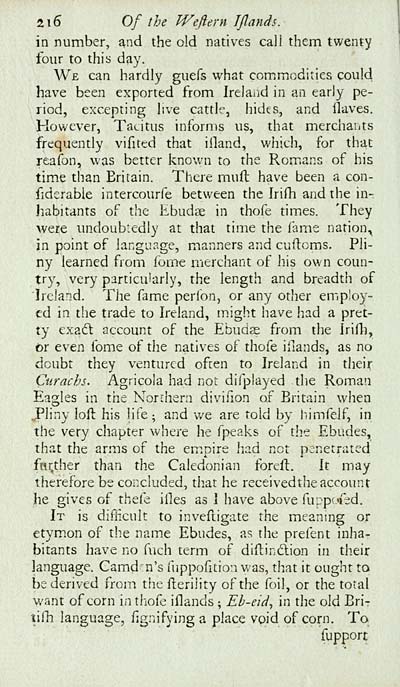Blair Collection > Critical dissertations on the origin, antiquities, language, government, manners, and religion, of the antient Caledonians, their posterity the Picts, and the British and Irish Scots
(254)
Download files
Complete book:
Individual page:
Thumbnail gallery: Grid view | List view

2i6 Of the Wefteni Jflands.
in number, and the old natives cali them twenty
four to this day.
We can hardly guefs what commodities could
have been exported from Ireland in an early pe-
riod, excepting live cattle, hides, and llaves.
However, Tacitus informs us, that merchants
frequently vifited that illand, which, for that
reafon, was better known to the Rom.ans of his
time than Britain. There muil have been a con-
fiderable intercourfe between the Irifh and the in-
habitants of the Ebudee in thofe timics. They
were undoubtedly at that time the fame nation.^
in point of language, manners and cuftoms. Pli-
ny learned from fome merchant of his own coun-
try, very particularly, the length and breadth of
Ireland. The fame perlbn, or any other employ-
ed in the trade to Ireland, miglit have had a pret-
ty exad account of the Ebuds from the Iridi,
cr even fome of the natives of thofe iilands, as no
doubt they ventured often to Ireland in their
Curacbs. Agricola had not difplayed die Roman
Eagles in the Northern divifion of Britain when
,Pliny loft his hfc; and v/e are told by himfelf, in
the very chapter where he fpeaks of the Ebudes,
that the arms of the empire liad not penetrated
ftt^ther than the Caledonian foreft. It may
therefore be concluded, that he receivedthe account
he gives of thefe iOes as I have above fupp'-fed.
It is difficult to inveftigate the meaning or
etym.on of the name Ebudes, ?s the prefent inha-
bitants have no fuch term of diftincfiion in their
language. Camdn's fuppofition v/as, that it ought to
be derived from the fteriiity of the foil, or the total
want of corn in thofe iflands ; Eb-eid, in the old Brir
til"h language, fignifying a place void of corn. To
fupport
in number, and the old natives cali them twenty
four to this day.
We can hardly guefs what commodities could
have been exported from Ireland in an early pe-
riod, excepting live cattle, hides, and llaves.
However, Tacitus informs us, that merchants
frequently vifited that illand, which, for that
reafon, was better known to the Rom.ans of his
time than Britain. There muil have been a con-
fiderable intercourfe between the Irifh and the in-
habitants of the Ebudee in thofe timics. They
were undoubtedly at that time the fame nation.^
in point of language, manners and cuftoms. Pli-
ny learned from fome merchant of his own coun-
try, very particularly, the length and breadth of
Ireland. The fame perlbn, or any other employ-
ed in the trade to Ireland, miglit have had a pret-
ty exad account of the Ebuds from the Iridi,
cr even fome of the natives of thofe iilands, as no
doubt they ventured often to Ireland in their
Curacbs. Agricola had not difplayed die Roman
Eagles in the Northern divifion of Britain when
,Pliny loft his hfc; and v/e are told by himfelf, in
the very chapter where he fpeaks of the Ebudes,
that the arms of the empire liad not penetrated
ftt^ther than the Caledonian foreft. It may
therefore be concluded, that he receivedthe account
he gives of thefe iOes as I have above fupp'-fed.
It is difficult to inveftigate the meaning or
etym.on of the name Ebudes, ?s the prefent inha-
bitants have no fuch term of diftincfiion in their
language. Camdn's fuppofition v/as, that it ought to
be derived from the fteriiity of the foil, or the total
want of corn in thofe iflands ; Eb-eid, in the old Brir
til"h language, fignifying a place void of corn. To
fupport
Set display mode to: Large image | Transcription
Images and transcriptions on this page, including medium image downloads, may be used under the Creative Commons Attribution 4.0 International Licence unless otherwise stated. ![]()
| Permanent URL | https://digital.nls.uk/76289405 |
|---|
| Description | A selection of books from a collection of more than 500 titles, mostly on religious and literary topics. Also includes some material dealing with other Celtic languages and societies. Collection created towards the end of the 19th century by Lady Evelyn Stewart Murray. |
|---|
| Description | Selected items from five 'Special and Named Printed Collections'. Includes books in Gaelic and other Celtic languages, works about the Gaels, their languages, literature, culture and history. |
|---|

